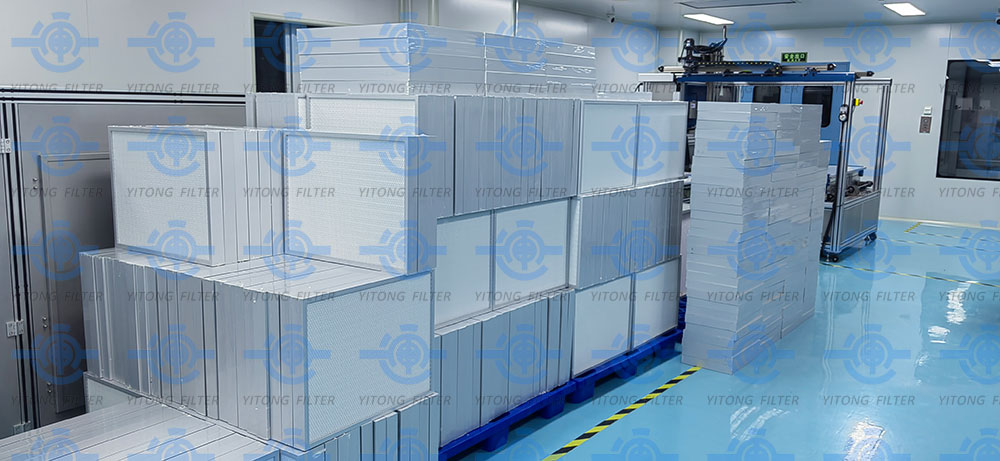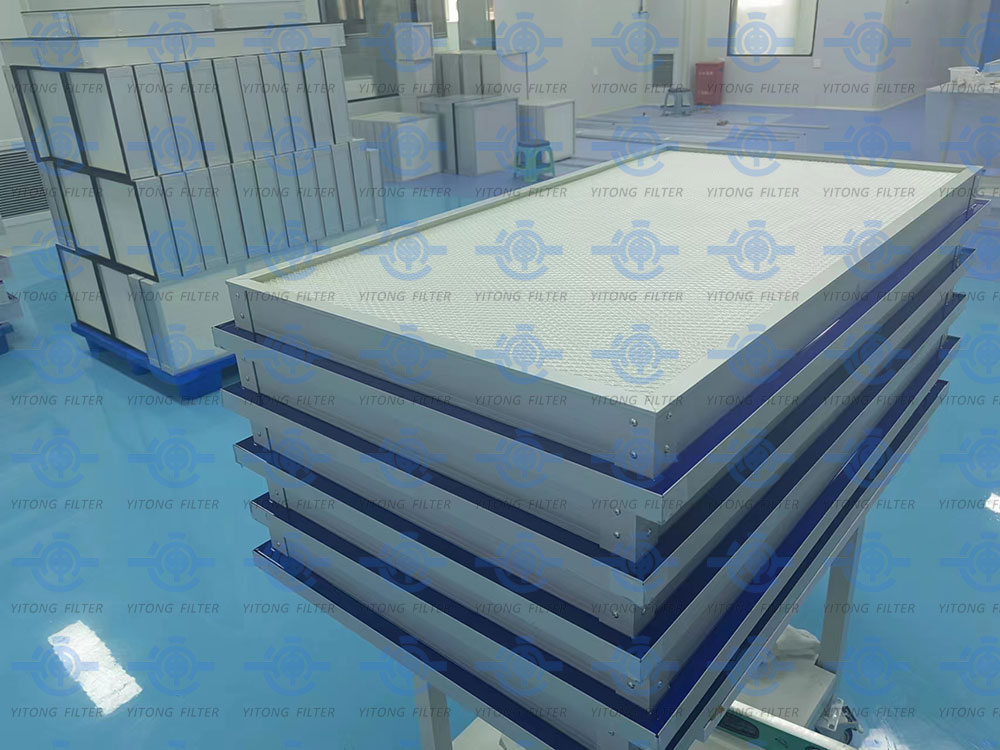 August 26, 2024
August 26, 2024
This article is about the common problems of H14 hepa filter. If you have any questions, please contact us. We have more than 20 years of experience in the filtration industry. Our technicians will provide you with professional services.
1. How often should I replace my H14 Filter?
Regarding the replacement interval of H14 Filter (i.e. H14 rated High Efficiency Air Filter, HEPA Filter), it is not a fixed time interval, but needs to be based on several factors. The following are some of the main factors affecting the replacement cycle of H14 Filter and the recommended replacement cycle:
I. Main factors affecting the replacement cycle
Use of the environment and conditions:
In industrial production workshops, laboratories and other environments, the replacement cycle of H14 Filter may be relatively short due to the high concentration of particulate matter in the air.
In places that require a highly clean air environment, such as hospital operating rooms, the replacement cycle of H14 Filter may be more stringent to ensure the cleanliness of the air during surgery.
Filter utilization and load:
Filter replacement intervals will be correspondingly shorter in the case of high filter utilization and load.
Filter sealing and installation quality:
Filters with good sealing are more effective in preventing unfiltered air from bypassing the filter, thus extending its service life.
The correct installation method and installation quality are also important factors affecting the service life of the filter.
Maintenance:
Regular maintenance of the filter, such as cleaning and inspection, can extend its service life.
Other factors:
Such as the fresh air ratio, the efficiency of the middle and lower efficiency filters, relative humidity control, the concentration of outdoor dust particles, etc., will also have an impact on the replacement cycle of H14 Filter.
Second, the recommended replacement cycle
General:
In industrial production workshops, laboratories and other environments, H14 Filter usually needs to be replaced every 12-18 months.
In hospital operating rooms and other places that require a highly clean air environment, the replacement cycle of H14 Filter may be shorter, and it is recommended to replace it every 12 months.
Special Circumstances:
If the filter is seriously clogged or broken, etc., it needs to be replaced promptly.
In some special places with very high requirements for air quality, such as Class 10K and Class 100K clean plants, the service life of H14 Filter can be extended to more than 5 or even 10 years through the reasonable configuration of pre-filter and protection level filter.
III. Precautions
Regular monitoring:
Regular monitoring of H14 Filter, such as differential pressure testing and scanning leakage testing, can detect abnormalities and take measures in time.
Adjust according to the actual situation:
The replacement cycle is not absolute and needs to be adjusted according to the actual situation. For example, in the case of poor air quality or high filter load, the replacement cycle should be shortened appropriately.
Professional maintenance:
For some complex filtration systems or H14 Filter in high-end equipment, it is recommended to seek professional help for maintenance and replacement.
In summary, the replacement cycle of H14 Filter needs to be judged comprehensively according to the specific use environment and conditions, the utilization rate and load of the filter, sealing and installation quality, maintenance and other factors. In general, it is recommended to replace the filter every 12-18 months; however, in special cases, such as when the filter has serious problems or when the air quality requirements are extremely high, it is necessary to replace the filter in time or take other measures to safeguard the air quality.

2. How should I choose the right H14 Filter for me?
When choosing the right H14 Filter (i.e. H14 rated High Efficiency Air Filter, HEPA Filter) for you, you need to consider the following key factors to ensure that the selected filter can meet your specific needs and expectations:
First, understand the use of the environment and needs
Air Quality Requirements: First of all, clarify the specific air quality requirements of your environment. If there are a large number of tiny particles, bacteria, viruses and other pollutants in the environment, and the air quality requirements are very high (such as hospital operating rooms, precision electronics workshop, etc.), the H14 Filter is a more appropriate choice.
Space size: according to the size of the use of space to choose the appropriate size of the filter. H14 Filter has a variety of sizes to choose from, such as 610 * 610 * 90mm, 915 * 610 * 90mm, etc., to ensure that the filter can cover the entire space and provide sufficient filtration effect.
Second, consider the performance parameters of the filter
Filtration efficiency: The filtration efficiency of H14 Filter should be ≥99.995%, which can efficiently filter out the tiny particles in the air. Ensure that the filtration efficiency of the selected filter meets this standard.
Initial resistance and final resistance: Understand the initial resistance and final resistance of the filter to ensure smooth air flow and not cause excessive burden on the ventilation system.The initial resistance of H14 Filter is generally ≤200Pa, and the final resistance is 2-2.5 times of the initial resistance.
Rated air volume: choose the appropriate rated air volume according to the specific needs of the space. Rated air volume refers to the air flow that can be handled by the filter under normal working conditions, and it should be ensured that the rated air volume of the selected filter can meet the demand of air circulation in the space.
Attention to the material and durability of the filter
Filter material: H14 Filter is usually made of high efficiency filter material such as ultra-fine glass fiber paper, which has excellent filtration performance and durability. Ensure that the filter material you select meets industry standards and is of reliable quality.
Sealing performance: Good sealing performance is critical to ensure filtration effectiveness. Select filters that use new polyurethane sealant and other high-quality sealing materials to ensure that their sealing performance meets the requirements.
Consider the convenience of installation and maintenance
Installation method: Choose a suitable installation method according to the specific requirements of the usage scenario, such as frame installation or bulk installation. Ensure that the installation of the selected filter is simple and easy and meets the requirements of the usage scenario.
Maintenance cost: Understand the maintenance cost and replacement cycle of the filter so that you can budget and plan well during the use. Although the filtration efficiency of H14 Filter is extremely high, its cost is also relatively high, so you need to consider the economy of long-term use.
V. Choose regular brands and suppliers
Brand reputation: Choose filter brands with good brand reputation and word-of-mouth to ensure product quality and after-sales service are guaranteed.
Supplier qualification: Understand the qualification and strength of the supplier, and choose a supplier with rich experience and professional knowledge to cooperate in order to get better support and help in the process of purchase and use.
To summarize, to choose the right H14 Filter for you, you need to consider a number of factors such as the use of the environment, performance parameters, material durability, ease of installation and maintenance, as well as brand reputation. By comprehensively considering these factors, you can choose the H14 Filter that meets your needs and has a good cost performance, providing clean and healthy air for your living and working environment.

3. Can l H14 Filter relieve allergy and asthma symptoms?
H14 Filter (i.e. H14 rated high efficiency air filter, HEPA Filter) does have significant effect in relieving allergy and asthma symptoms. The following is a detailed analysis:
First, the filtration efficiency of H14 Filter
H14 Filter is known for its extremely high filtration efficiency, capable of filtering out more than 99.995% of tiny particles in the air, including dust, pollen, bacteria, viruses, mold spores and pet dander. These particles are often important triggers for allergy and asthma symptoms.
II. Relief of Allergy Symptoms
Reduction of allergens: By efficiently filtering airborne allergens such as pollen, dust mites, mold spores, etc., H14 Filter reduces the chances of these allergens coming into contact with the human body, thus reducing the incidence and severity of allergic reactions.
Improvement of indoor air quality: A clean air environment helps reduce allergy symptoms such as sneezing, runny nose, itchy eyes, etc. The use of H14 Filter can significantly improve indoor air quality and provide a more comfortable living environment for allergy sufferers.
III. Relief of Asthma Symptoms
Reduce irritants: Asthma patients are often very sensitive to tiny particles and irritating gases in the air. H14 Filter can filter out these irritants and reduce their irritation to the respiratory tract of asthma patients, thus relieving asthma symptoms.
Reduced risk of infection: Airborne bacteria and viruses are also important triggers for asthma attacks, and by efficiently filtering out these microorganisms, the H14 Filter reduces the risk of respiratory infections that can cause asthma in asthmatics.
In summary, the H14 Filter plays an important role in relieving allergy and asthma symptoms. By efficiently filtering tiny airborne particles and irritants, it provides a cleaner, more comfortable living environment for allergy and asthma sufferers, thereby reducing their symptoms and improving their quality of life.

